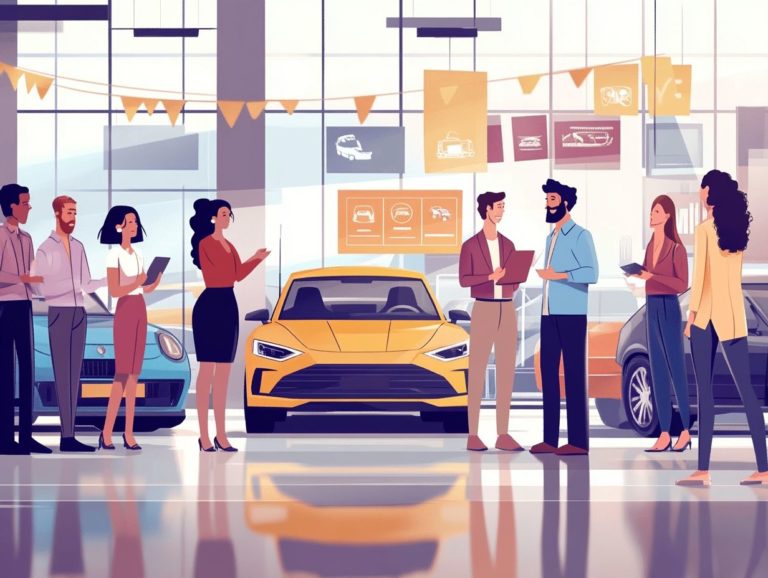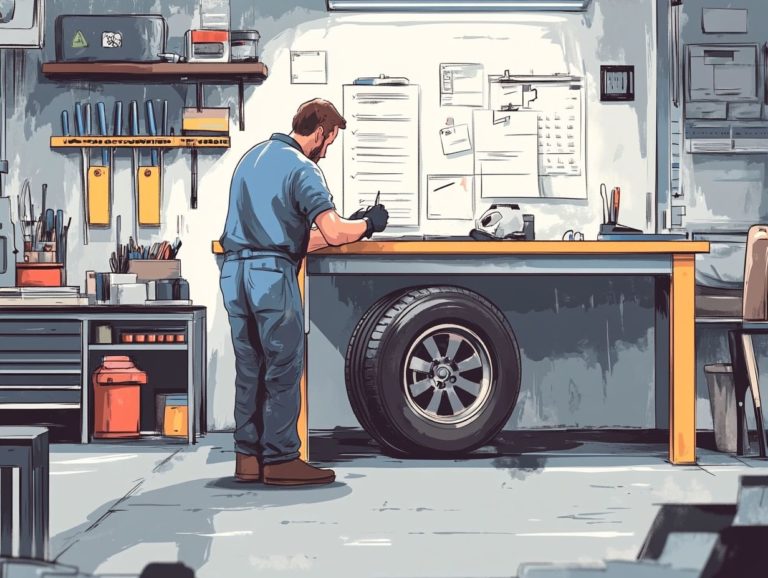The Best Time of Year to Buy Used Cars
Buying a used car can be one of the most rewarding investments you make. It provides substantial savings and a diverse array of options tailored to your tastes.
Navigating the used car market requires more than simply picking a model. Understand price trends and inventory availability. Seasonal demand can also help you find the best deals.
This guide delves into optimal buying times, key factors to consider, and invaluable tips for negotiating with both dealerships and private sellers.
Whether you re a first-time buyer or seeking an upgrade, this information will empower you to make an informed and confident purchase.
Contents
- Key Takeaways:
- Benefits of Buying Used Cars
- Factors to Consider When Buying Used Cars
- Best Time of Year to Buy Used Cars
- Tips for Finding the Best Deals on Used Cars
- Frequently Asked Questions
- When is the best time of year to buy used cars?
- Are there certain months that are better for buying used cars?
- What day of the week is best for buying a used car?
- Do prices for used cars fluctuate throughout the year?
- Are there any specific events or holidays that are good for buying used cars?
- Should I wait for a specific time of year to buy a specific type of used car?
Key Takeaways:
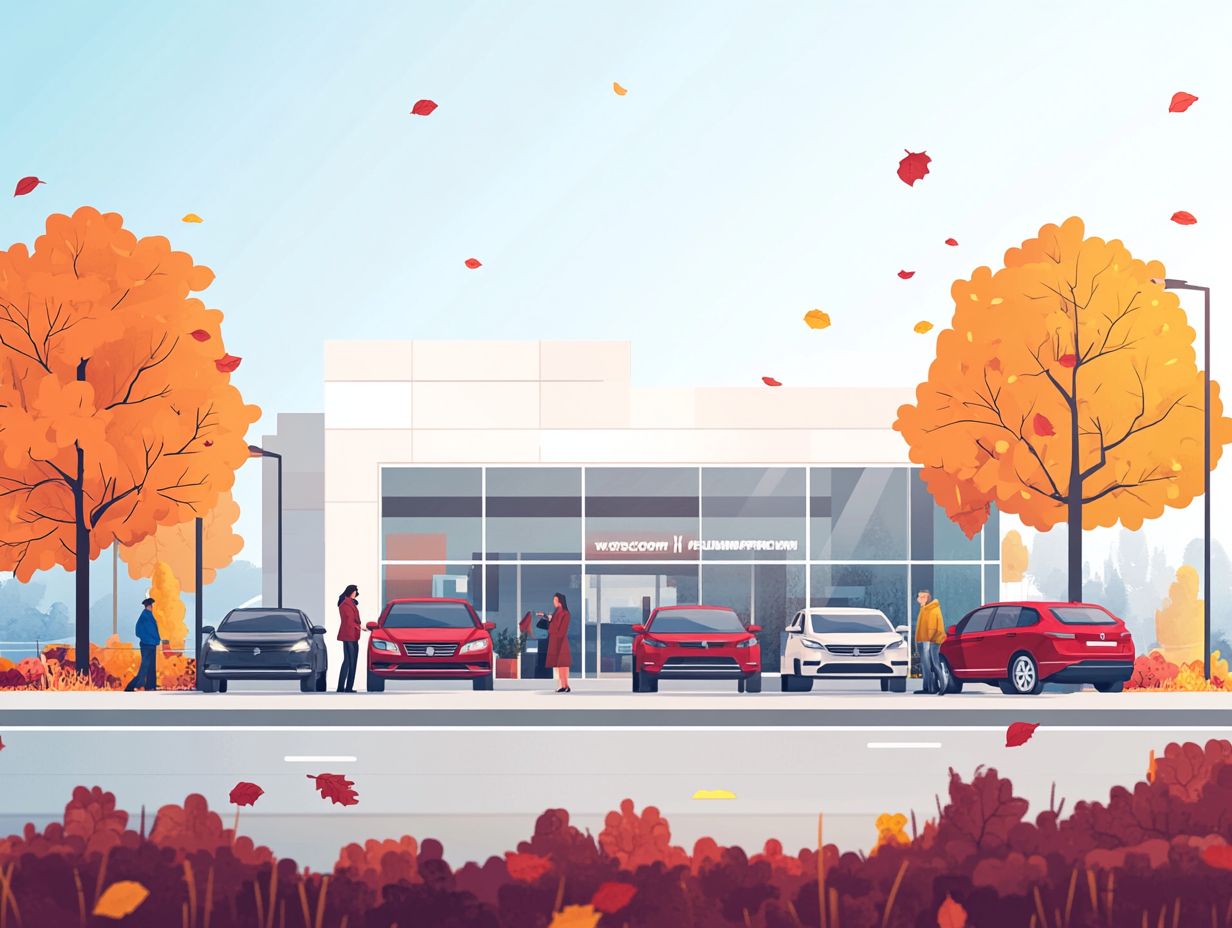
Save money by buying used cars during the off-season! Fall and winter are ideal times, as demand drops and prices become more negotiable.
Do thorough research and negotiate with both dealerships and private sellers to find the best deals on used cars.
Benefits of Buying Used Cars
Purchasing a used car offers a wealth of advantages. Chief among them are significantly lower prices and an impressive variety of vehicle makes and models. You’ll find substantial discounts compared to brand-new cars!
As a savvy shopper, you can use trade-ins to negotiate better deals, making used cars a compelling choice for budget-conscious individuals. Investing in a used vehicle often yields greater value over time, especially when you consider maintenance costs and depreciation.
Factors to Consider When Buying Used Cars
When you re on the hunt for a used car, start by assessing your current vehicle needs and establishing a realistic budget.
It s wise to evaluate financing options tailored to your credit score, as this can significantly influence your overall costs. Stay informed about how the economy and fuel prices affect car prices.
By having a clear vision of what you desire, you can avoid the pitfalls of desperation and leverage periods of higher supply to secure an exceptional deal.
Price Trends
Price trends for used cars can vary dramatically with the seasons. Savvy shoppers like you can capitalize on these fluctuations to secure attractive discounts. Recognizing less favorable times to buy such as during peak demand can help you decide when to hold off for better pricing.
Typically, in the spring and summer months, demand surges as consumers upgrade for travel or family outings. Conversely, winter sees a dip in vehicle purchases. The colder weather keeps shoppers at bay, prompting dealers to roll out enticing deals to clear their inventory.
Market conditions like the economy’s health or shifts in fuel prices play a significant role in determining the value of used cars. By keeping a close watch on these trends, you can strategically time your purchases and optimize your savings.
Availability of Inventory
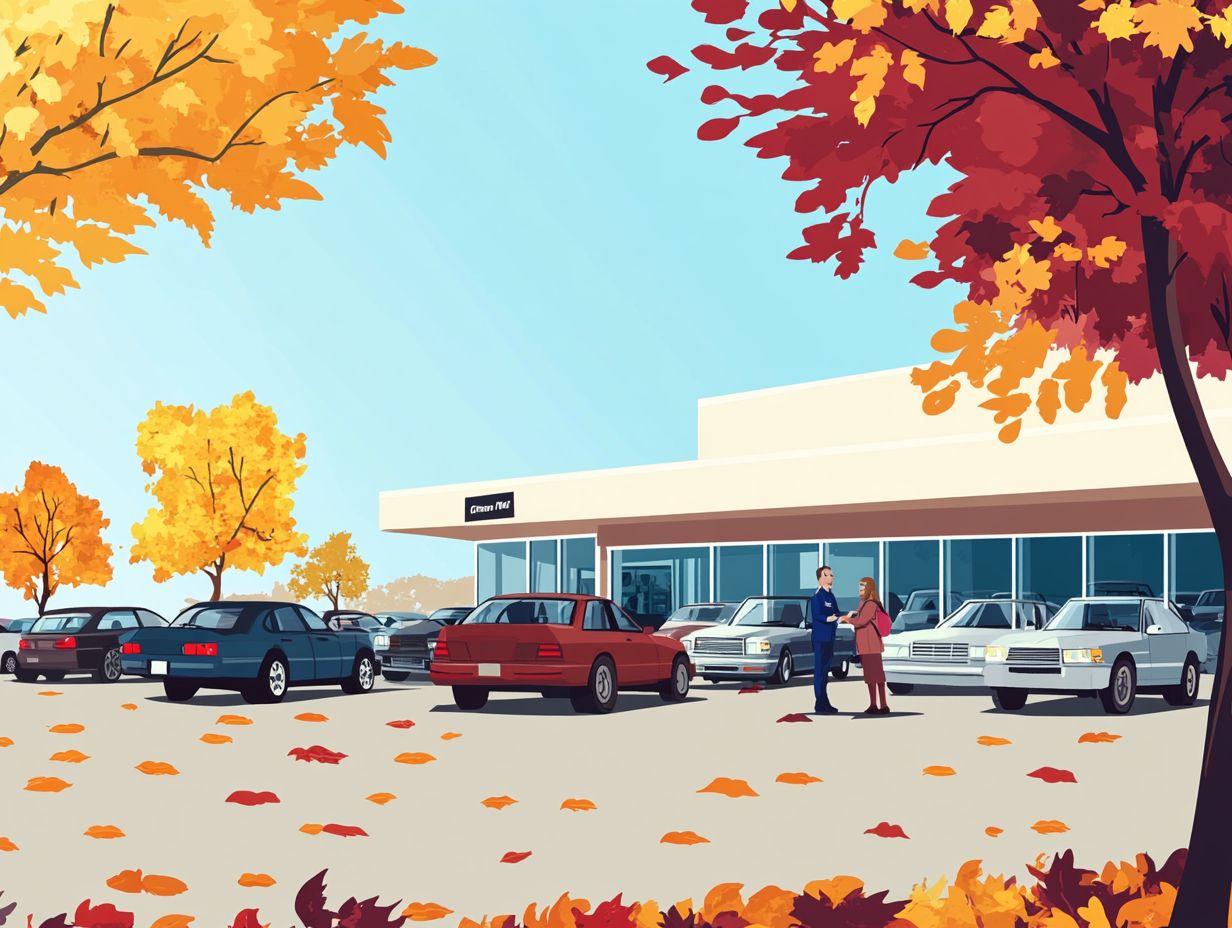
The availability of inventory for used cars varies significantly, especially at the end of the month. Dealerships often experience increased inventory levels due to trade-ins and the push to meet sales goals. This can create stronger demand for certain vehicle makes, presenting you with opportunities to discover better deals.
This fluctuation pressures dealerships to adjust their sales strategies swiftly. As new trade-ins arrive, managing older inventory becomes critical for these businesses.
Timing is everything; consumers like you are more eager to purchase during peak seasons, such as summer. If a particular model gains traction or makes headlines, you might see demand surge unexpectedly.
Understanding these inventory dynamics is essential, helping you navigate the used car market with confidence and insight. Stay informed, and you ll drive away with the best deal!
Seasonal Demand
Seasonal demand holds significant sway in the used car market, with particular times of the year like holiday sales or public car auctions often witnessing a surge in buying activity. By grasping these patterns, you can strategically time your purchases to capitalize on the best seasons for lower prices.
Take, for example, the end of the year; it frequently ushers in holiday promotions that may lead to substantial discounts, luring consumers to make vehicle purchases. Similarly, public car auctions tend to peak in spring and summer as dealers work to clear out older inventory, offering you a broader selection of choices.
This seasonal ebb and flow not only influences the availability of specific models but also noticeably impacts pricing, primarily because of the heightened competition among buyers during these critical times. Therefore, if you have a keen eye for seasonal trends, you can fully leverage market cycles and secure better deals.
Best Time of Year to Buy Used Cars
Knowing the best times can save you money!
Identifying the best time of year to purchase a used car can profoundly influence both your overall buying experience and financial results. For those looking to buy new, knowing the best times to buy a new car can lead to more favorable prices, particularly when considering models from the previous year.
Key moments, such as the year’s end or during holiday promotions, present you with exceptional opportunities for deals and significant savings.
Factors That Affect the Best Time to Buy
Several factors influence the best timing for purchasing a used car, including financing deals, trade-ins, and market conditions that drive higher supply and lower demand creating great deals for savvy buyers. Grasping these variables is essential for making a well-informed purchase.
Seasonal trends, particularly the influx of new models in late summer or early fall, often compel dealerships to clear out older inventory. This seasonal shift opens the door to great deals for consumers eager to strike a deal.
Keep an eye on fluctuations in interest rates. These can significantly impact your financing options, so it s wise to keep a close eye on these changes.
Consumer behavior, shaped by economic factors and individual circumstances, also plays a critical role. For instance, if a significant number of buyers hold off on purchases due to uncertainty, it can lead to reduced competition enhancing your negotiation power in the market.
Specific Months to Look Out For
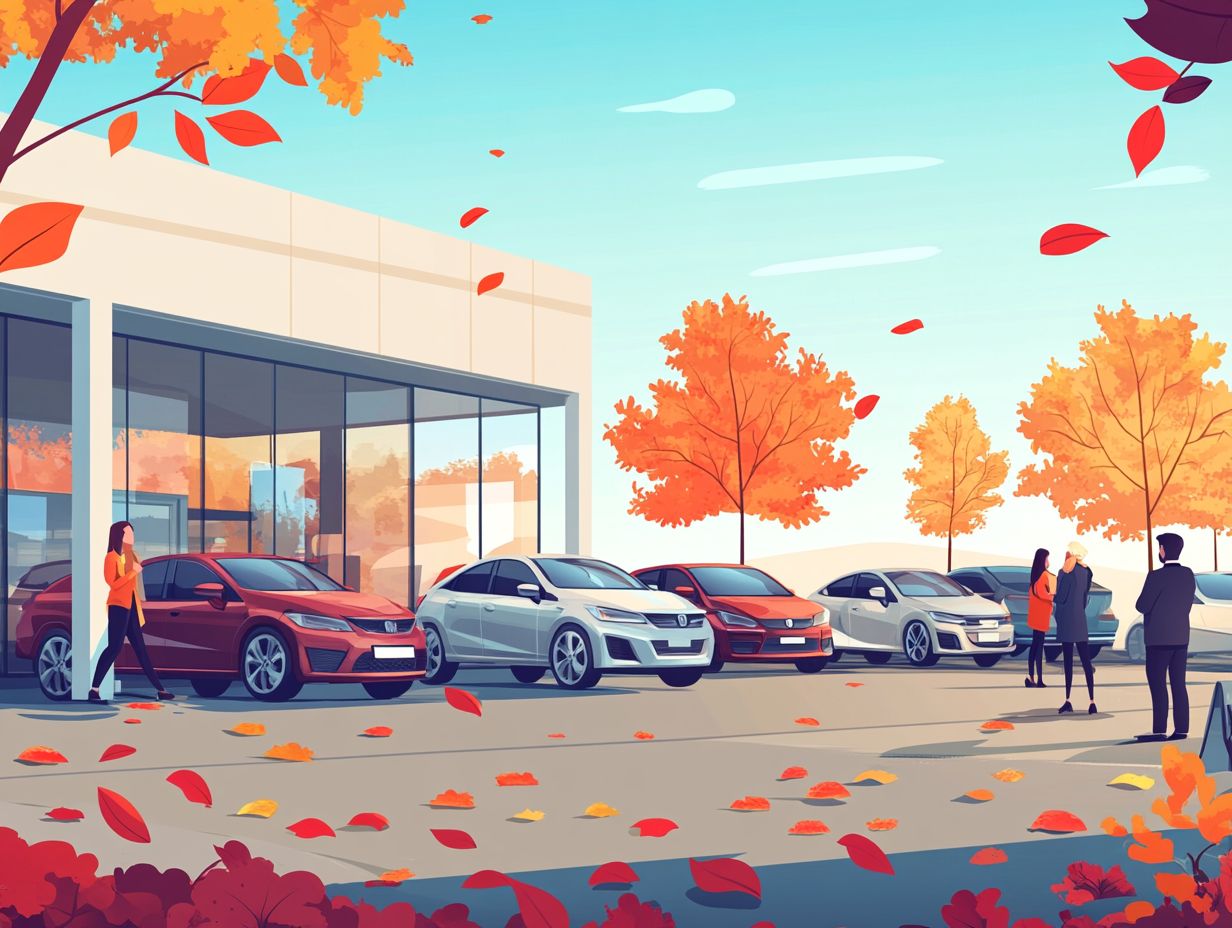
Certain months are golden opportunities for buying used cars! Memorial Day, Labor Day, and Black Friday lead the charge. These occasions bring exciting promotions and special deals aimed at clearing out inventory as fiscal periods come to a close. By recognizing these prime months, you can unlock substantial savings.
Beyond those major holidays, January and July also present unique advantages for the discerning shopper. In January, dealerships are typically eager to make space for the new year’s models, which leads to great deals on older inventory.
Meanwhile, as summer rolls in, particularly in July, dealers frequently host clearance sales to attract budget-conscious families eager to make a purchase before the school year kicks off.
As you navigate these months, keep an eye out for events that accompany them; they often include enticing incentives like zero-percent financing or cash-back offers, creating the perfect environment for negotiating a favorable deal.
Tips for Finding the Best Deals on Used Cars
Finding the best deals on used cars takes research, negotiation skills, and a good understanding of car insurance options, alongside knowing how to engage with both dealerships and private sellers.
By adopting the right strategies, you can confidently secure the vehicle you desire at the most advantageous price.
Researching and Negotiating
Researching and negotiating effectively are essential steps in your car purchasing journey. They enable you to maintain a clear vision of your objectives and avoid the pitfalls of desperation that can lead to unfavorable terms. A well-informed approach can unlock significant savings.
By thoroughly understanding market trends and pricing for used vehicles, you not only enhance your negotiating power but also build the confidence needed to walk away from deals that don’t meet your expectations. Familiarity with various models and comparable prices helps you identify a fair value. Awareness of local supply and demand dynamics can also work in your favor.
Doing thorough research makes you feel empowered. This ensures you feel secure in your choices, leading to smarter decisions and ultimately, a worthwhile investment.
Working with Dealerships and Private Sellers
Working with dealerships and private sellers requires a keen understanding of the nuances involved, especially when it comes to negotiating lower prices and securing time-sensitive deals on various vehicle models. Each seller type has its own perks and challenges, making the buying journey exciting.
Dealerships typically offer a more structured approach to negotiations. They often present enticing financing options and warranty packages. However, be aware that they might have limited flexibility in price adjustments due to overhead costs.
Private sellers are often more willing to negotiate, potentially leading to significant savings. Yet, you should proceed with caution. The absence of a warranty and less formal processes can introduce various risks.
By grasping these dynamics, you can skillfully navigate the complexities of the buying process, ensuring that you make informed decisions no matter which path you choose.
Frequently Asked Questions
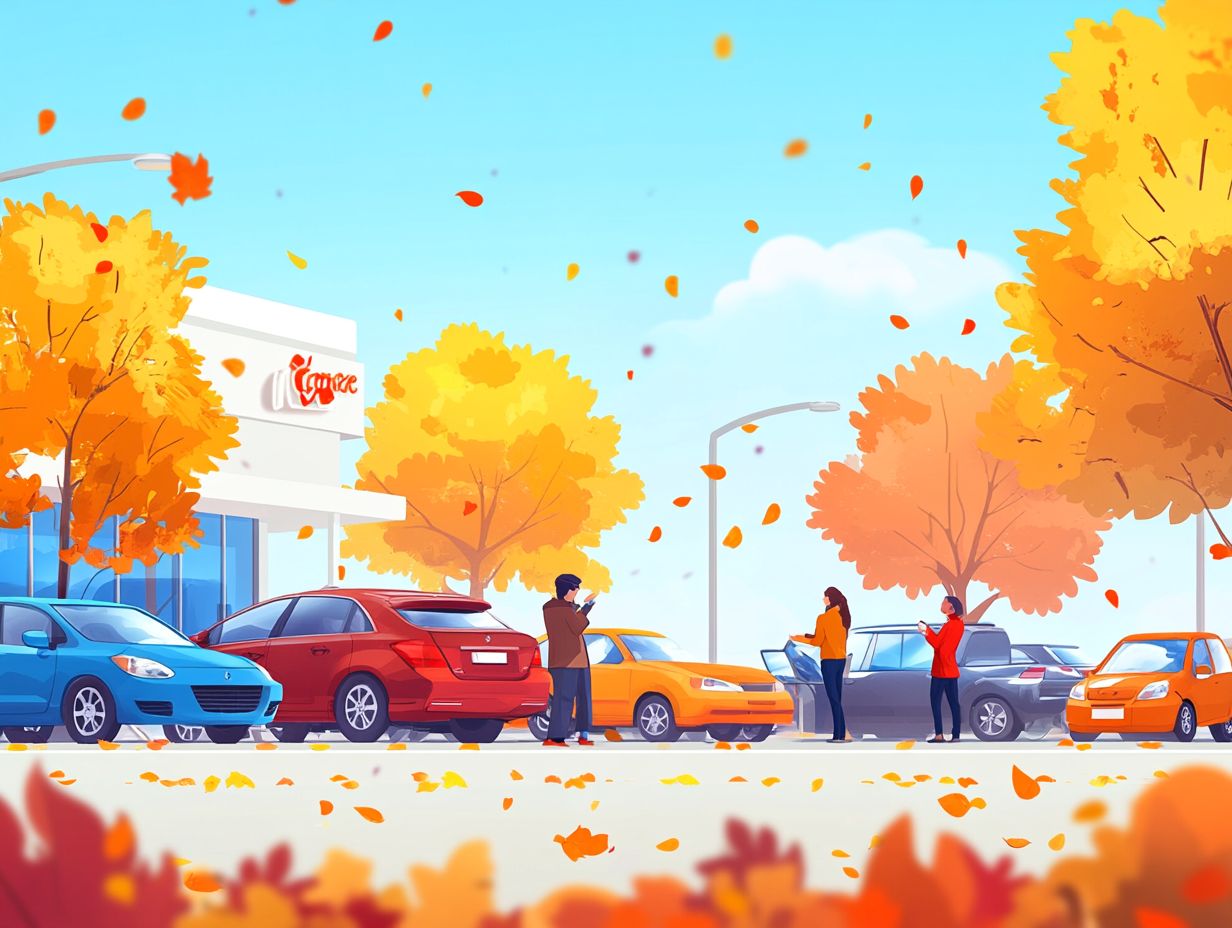
When is the best time of year to buy used cars?
The best time of year to buy used cars is typically at the end of the year or during holiday sales events. According to a guide on the best times to buy used cars, dealerships want to clear out their inventory to make room for new models, so you can often find great deals during these times.
Are there certain months that are better for buying used cars?
Yes, the months of October, November, and December are usually the best times to buy used cars. Dealerships are trying to meet end-of-year sales targets and are more willing to negotiate prices during this period. For additional insights, check out these tips for buying used cars in winter.
What day of the week is best for buying a used car?
Typically, weekdays are better for buying used cars as there is less foot traffic and competition. Dealerships may also be more willing to negotiate prices during these slower days.
Do prices for used cars fluctuate throughout the year?
Yes, prices for used cars can fluctuate throughout the year. They may be higher during the summer months when demand is elevated and lower during the winter months when demand decreases.
Are there any specific events or holidays that are good for buying used cars?
Yes, holidays such as Memorial Day, Labor Day, and Black Friday are popular times for dealerships to offer sales and discounts on used cars. Keep an eye out for these events and take advantage of the deals.
Should I wait for a specific time of year to buy a specific type of used car?
It can be beneficial to wait for a specific time of year to buy certain types of used cars. For example, you may find better deals on SUVs during the winter months when there is less demand for them.
Ready to start your car-buying journey? Do your research and explore your options to find the best deal!


